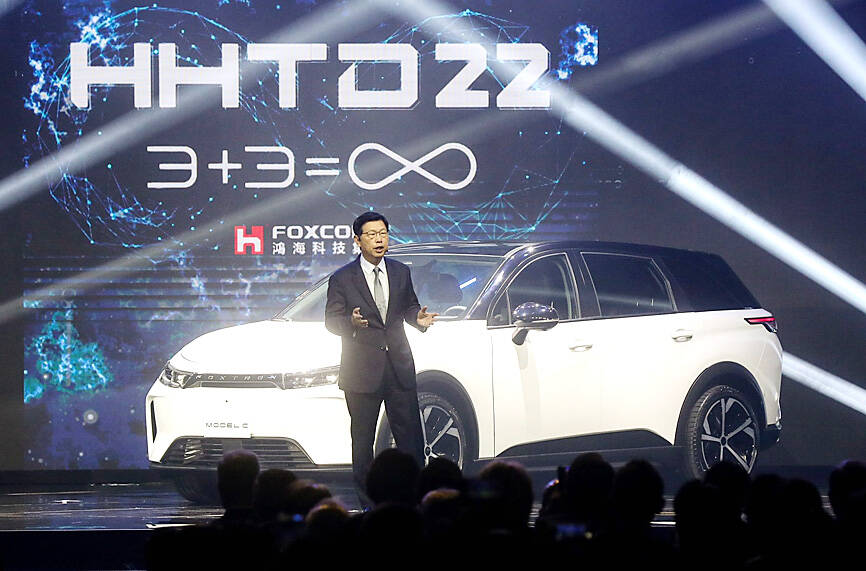Saudi Arabia’s Public Investment Fund Program (PIF) on Thursday said it plans to make electric vehicles (EV) in the kingdom under a joint venture, to be called Ceer, with Apple Inc supplier Foxconn Technology Group (富士康科技集團) as part of a push to build new industries and reduce its reliance on oil.
Ceer “is the first Saudi automotive brand to produce electric vehicles in Saudi Arabia, and will design, manufacture and sell a range of vehicles for consumers in Saudi Arabia and the MENA [Middle East and North Africa] region, including sedans and sports utility vehicles,” PIF said in a statement.
Its vehicles would be available in 2025, the fund said, adding that Ceer would draw more than US$150 million in foreign direct investment, create up to 30,000 direct and indirect jobs, and is projected to contribute US$8 billion to the kingdom’s GDP by 2034.

Photo: Cheng I-hwa, Bloomberg
The joint venture “will license component technology from BMW for use in the vehicle development process,” PIF said.
“Foxconn will develop the electrical architecture of the vehicles, resulting in a portfolio of products that will lead in the areas of infotainment, connectivity and autonomous driving technologies,” it added.
An investment strategy announced last year aims for more than US$100 billion in foreign direct investment annually, although Saudi Arabia lags behind those targets with more than US$4 billion in inflows in the first half of this year.
Chaired by Saudi Arabian Crown Prince Mohammad bin Salman, PIF is his chosen method to push efforts to diversify his country’s economy and wean it off oil.
Lucid Group Inc, which is more than 60 percent owned by PIF, is building an electric vehicle assembly plant in Jeddah, with a projected capacity to manufacture 150,000 vehicles a year.
The Saudi Arabian government signed a deal with Lucid to purchase up to 100,000 of its vehicles over the next 10 years.
The kingdom is also making a push into mining and said in May it would build an electric vehicle battery metals plant.
“We will leverage Foxconn’s technological expertise to support Ceer’s vision of creating a range of iconic electric vehicles that are built around the themes of connectivity, infotainment and autonomy,” Foxconn chairman Young Liu (劉揚偉) said, according to PIF’s statement.
“We want to make electric vehicles mainstream, and that is what Ceer is going to achieve in Saudi Arabia and the wider region,” he added.
PIF did not disclose funding details and did not say how much a Ceer plant would cost or where in the kingdom it would be built.
The Wall Street Journal in March reported that Saudi Arabia and Foxconn were in talks to jointly build a US$9 billion facility that could make microchips, electric vehicle components and other electronics in Neom, a futuristic US$500 billion city being built in Saudi Arabia’s desert.

The demise of the coal industry left the US’ Appalachian region in tatters, with lost jobs, spoiled water and countless kilometers of abandoned underground mines. Now entrepreneurs are eyeing the rural region with ambitious visions to rebuild its economy by converting old mines into solar power systems and data centers that could help fuel the increasing power demands of the artificial intelligence (AI) boom. One such project is underway by a non-profit team calling itself Energy DELTA (Discovery, Education, Learning and Technology Accelerator) Lab, which is looking to develop energy sources on about 26,305 hectares of old coal land in

Taiwan’s exports soared 56 percent year-on-year to an all-time high of US$64.05 billion last month, propelled by surging global demand for artificial intelligence (AI), high-performance computing and cloud service infrastructure, the Ministry of Finance said yesterday. Department of Statistics Director-General Beatrice Tsai (蔡美娜) called the figure an unexpected upside surprise, citing a wave of technology orders from overseas customers alongside the usual year-end shopping season for technology products. Growth is likely to remain strong this month, she said, projecting a 40 percent to 45 percent expansion on an annual basis. The outperformance could prompt the Directorate-General of Budget, Accounting and

Netflix on Friday faced fierce criticism over its blockbuster deal to acquire Warner Bros Discovery. The streaming giant is already viewed as a pariah in some Hollywood circles, largely due to its reluctance to release content in theaters and its disruption of traditional industry practices. As Netflix emerged as the likely winning bidder for Warner Bros — the studio behind Casablanca, the Harry Potter movies and Friends — Hollywood’s elite launched an aggressive campaign against the acquisition. Titanic director James Cameron called the buyout a “disaster,” while a group of prominent producers are lobbying US Congress to oppose the deal,

Two Chinese chipmakers are attracting strong retail investor demand, buoyed by industry peer Moore Threads Technology Co’s (摩爾線程) stellar debut. The retail portion of MetaX Integrated Circuits (Shanghai) Co’s (上海沐曦) upcoming initial public offering (IPO) was 2,986 times oversubscribed on Friday, according to a filing. Meanwhile, Beijing Onmicro Electronics Co (北京昂瑞微), which makes radio frequency chips, was 2,899 times oversubscribed on Friday, its filing showed. The bids coincided with Moore Threads’ trading debut, which surged 425 percent on Friday after raising 8 billion yuan (US$1.13 billion) on bets that the company could emerge as a viable local competitor to Nvidia